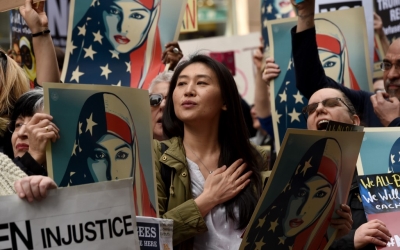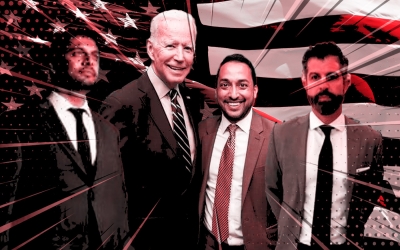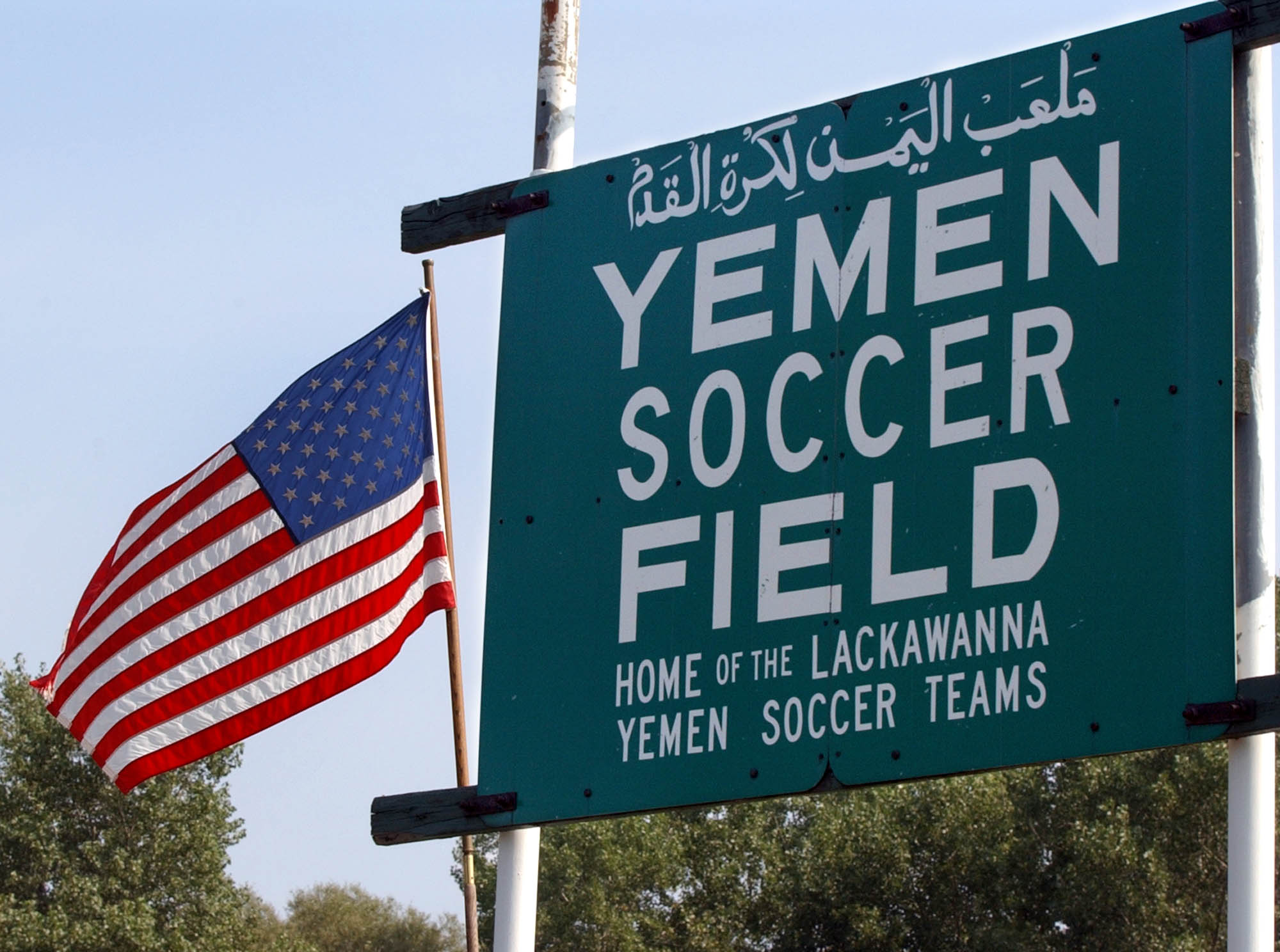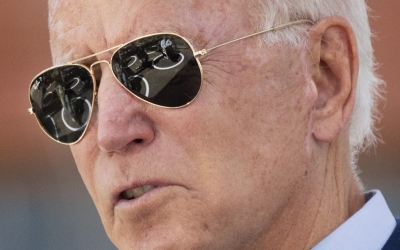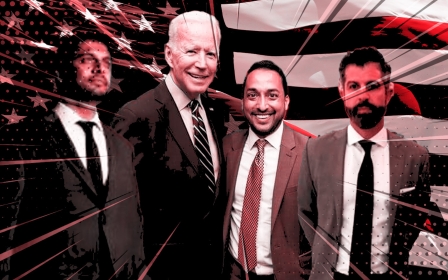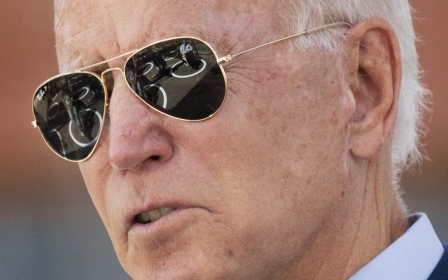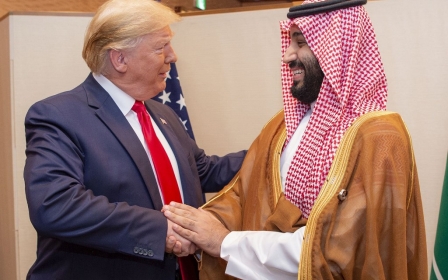US election 2020: Voter suppression attempt against Arab Americans alleged
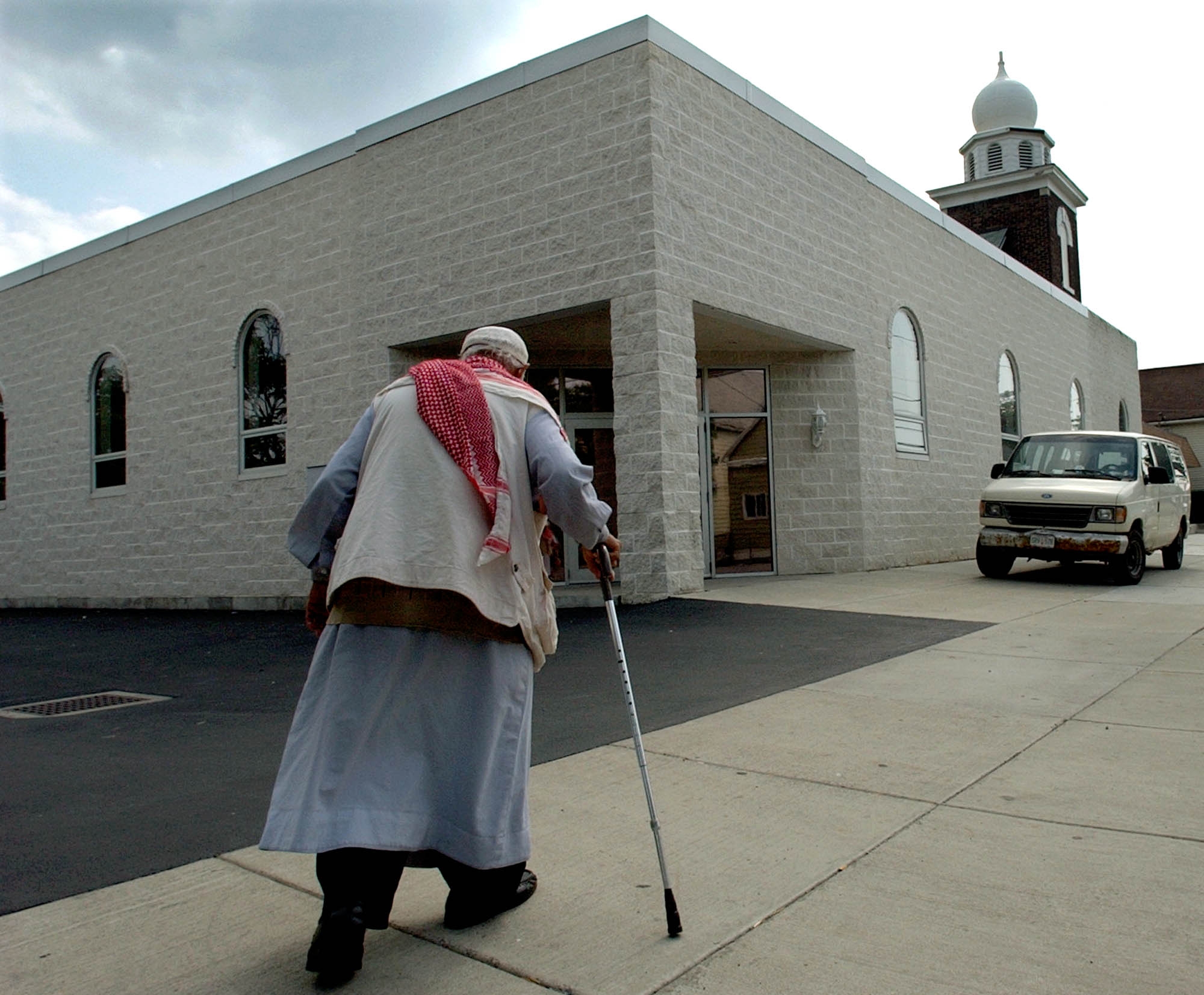
Why a former mayor of Lackawanna, New York, objected to 200 ballots seemingly cast by members of the local Yemeni community in June remains a mystery.
Since it was uncovered in August, Geoffrey Szymanski has refused to comment on the matter.
The former mayor is now a city council member running for re-election and the executive director of the Buffalo and Erie County workforce investment board. Until he quietly resigned last week, he was also the chairman of the Lackawanna Democratic Party.
But on 30 June, Szymanski stepped outside of his government roles into the shoes of a private citizen to review absentee ballots cast in the city's Democratic Party committee election. He submitted several sets of objections that amounted to a list of 200 names, all but one of which were Arab or Muslim sounding.
With a population of around 18,000, Lackawanna is a quiet working-class town known for its old steel mill that attracted early Yemeni immigrants looking for work in the 1950s during the "Great Migration". The mill went out of operation in 1982 and since then the local Arab-American community is known for opening small businesses.
It's estimated that between 20 and 30 percent of the town's population is of Arab descent, mostly Yemeni American.
But the apparent targeting of one ethnic group is not the only issue raising questions in the small blue-collar town.
Around half of the names Szymanski submitted did not correlate with an actual absentee ballot - some of them were not even registered to vote. After more than two months of pushing for answers, the question of where the names came from remains unresolved.
The former mayor also made the objections "on behalf" of ten non-Arab candidates in the race - naming each one specifically - but several of those candidates told Middle East Eye and local activists that they gave him no authority to do so, saying they never made such a request.
There have also been indications that this might not have been the first time such a thing has happened.
Big questions in a small town
It all started during Lackawanna's June primary. At the time, six districts in the town had two open Democratic Party committee seats to fill. Four candidates ran in each district. Coincidentally, in every race there were two Arab-American candidates and two non-Arab candidates.
All but one district had between 30 and 80 voters' names marked with objections filed by Szymanski. More than a month later, a local civil rights lawyer named Peter Reese submitted a Freedom of Information Law (FOIL) request to obtain the records of all ballots with objections attached. Szymanski's were the only ones on file.
Seemingly tipped off, he withdrew his objections less than an hour after Reese's request was made.
Jeremy Zellner, chairman of the county's Democractic Party committee and commissioner of its board of elections - who local activists allege is a close friend of Szymanski - told MEE that he did not think the incident merited an investigation.
'Councilman Szymanski undoubtedly attempted to use his political influence to suppress the vote of many Arab- American Muslims'
- Amira Muflahi, organiser with VOICE
As the chairman of the city's Democratic Party committee, Szymanski worked under Zellner.
"This really doesn't have anything to do with us. We at the party, you know, we have 27 different towns in our county here," Zellner said in a phone interview.
"I don't know what there would be an investigation about, he made these objections, he withdrew them, and I don't know what else there is to talk about," he said.
At first insisting the incident had nothing to do with his offices, when pressed regarding names submitted that did not correlate with any existing absentee ballots, Zellner said it was for that reason that he personally "suggested to him that he withdraw the objection because it was clearly a faulty objection, based upon the fact that a lot of the people weren't even voters".
"I don't think there's any law against something like this anyway," Zellner added. "I mean, anyone can place an objection to anyone at any time."
The civil rights department of the New York state attorney general's office, however, does not seem to share Zellner's sentiment regarding the case lacking the merit for an investigation, confirming on 1 October that an official probe by their office had been opened.
Arab Americans win half the seats
The five districts in which Szymanski chose to file objections were all very close races. The Arab-American candidates ended up winning six seats in three districts.
In two other districts, they lost by slim margins - with the Arab-American candidates each gaining double-digit percentages in the four-way races despite their losses.
The only district in which Szymanski did not file objections was the one district that the Arab-American candidates had no chance to win, as they received a combined 13 percent of the vote compared with the 87 percent won by the two non-Arab candidates.
The town's Democratic Party committee is the gatekeeper of local politics. In the mostly Democratic town, it is the committee that gets to choose which candidates the party picks to support for local office.
With between 314 and 672 voters in each district, 200 cancelled votes could have gone a long way in skewing the election.
Derek Murphy, communications director for the Erie County Board of Elections, which Zellner heads, told MEE that the board played "no role in what [Szymanski] did".
"As of June 30th, the public was able to come in and view the absentee ballot envelopes that came in. So apparently, Mr Szymanski did that, and from that derived, in part, his list of objections," Murphy said.
"Now, his list... included people who did not ask for ballots. And I can't explain that. I don't know where those names came from. But he came in on the same day when the public was able to do that… so there was no special access, there was no unusual access," he said.
'Going through massive changes'
Murphy explained that when a member of the public comes into the board of elections to review absentee ballots, they are given the envelopes of the ballots that had been submitted, which show the voters' signature on the outside. They are also given a list of those who had requested absentee ballots.
Ballots are generally flagged for election authorities to review because of a discrepancy between the signature the voter had on file and the one used to sign the ballot. But since half the names did not correlate to ballots, that could not have been the reason Szymanski included them in his list of objections.
"You'd have to ask him where he got those names," Murphy said.
MEE was able to confirm that at least two candidates that had objections filed on their behalf - Dean and Scott Moretti, who each lost by around a dozen votes - said they had nothing to do with Szymanski's actions.
"The objections were not requested by my son Scott or by myself," Dean Moretti, who is currently on the city council, said in an email.
In several districts the two non-Arab candidates who ran in the same race were husband and wife, father and son, or otherwise related.
"Lackawanna is going through massive changes," Dean Moretti told MEE. "We are looking to correct many past mistakes."
What exactly those mistakes amount to remains unclear. Dean Moretti did not respond to phone calls following his emailed response.
Several other candidates did not return MEE's multiple attempts to contact them.
Calling for Szymanski's sacking
Amira Muflahi, one of the Yemeni-Americans candidates in June's race who won by about 100 votes, has attempted for weeks to get answers from local officials.
Also a founding member of Voters Organized to Inspire Civic Engagement (VOICE), a local voting rights group, Muflahi said the incident was a clear attempt at "voter suppression" against Arab and Muslim communities.
After working with other activists to put together a plan of action following the discovery of the objections in August, on 8 September Muflahi addressed the Lackawanna city council, urging the body to sack Szymanski from his councilman seat, or to demand his resignation.
While Szymanski dropped his bid for Democratic Party chairman, replaced on Thursday by city clerk Jeff Depasquale, he remains one of the five members of the city council.
"Councilman Szymanski undoubtedly attempted to use his political influence to suppress the vote of many Arab-American Muslims," Muflahi told the council.
"[He] should not be granted the privilege to continue to represent citizens of the City of Lackawanna while actively trying to suppress their vote … Members of the Council should not be complicit, but rather protectors of our constitutional liberties," she continued.
Before the meeting, Muflahi told MEE that the city council's handling of the situation would indicate to the community whether the incident was that of a rogue official or a situation of systemic corruption.
The council heard Muflahi's concerns, but council president Fred Marrano simply thanked her and referred her to the board of elections or the Democrat Party committee for the issue to be taken up with them, "as it's not city business".
Szymanski, who was present on the council, made no move to respond. He also did not respond to MEE's repeated attempts to contact him.
On 5 October, following the NYAG's office decision to open a probe into accusations of the councilman's alleged voter suppression, Muflahi tried to bring up the subject again at a city council meeting. This time, Marrano barred her from speaking on the matter as it was "not on the agenda".
What was on the agenda that day was a resolution introduced by Szymanski to rename the town's 45-year-old soccer stadium from the "Lackawanna Yemen Soccer Club" to the "Lackawanna Soccer Stadium". An issue of debate for years, Szymanski proposed a compromise: change the stadium's name but name the field in honour of the Yemen Soccer Club's beloved founder.
A week previously, the Yemen Soccer Club's sign had been ripped out of the ground by city orders, only to be reinstalled after public outrage. Muflahi said Szymanski's move to introduce the resolution seemed odd because the stadium was not located in his ward.
"Why is he interfering with first ward affairs? We have an elected official for the first ward that can speak on it," she said. "All of a sudden he's now trying to appease the community [with a compromise] after he's being investigated by the AG's office - that seems calculated."
'Who the hell is paying this guy?'
Muflahi and other activists, including Reese, the civil rights attorney working with her and VOICE, say Szymanski is a man with a lot of connections in Lackawanna, desperately trying to hold on to power.
Looking into his records, Reese and Muflahi found that while Szymanski had been appointed executive director of the Buffalo and Erie County workforce investment board in January - a $87,000 a year position - he has yet to be put on the office's payroll.
Since Szymanski's position bars him from engaging in political work while on the clock, the two tried to find out if he had requested time off work the Tuesday morning he made those 200 objections, but ran into a wall.
"If you took four hours of vacation on Tuesday because you did some political work or personal work, whatever, that's going to show up on your timesheet. Well, the county comptroller, who happens to be a Republican … can't figure out how this guy's getting paid," Reese said. "They have a payroll record system, and he's not in it ... Who the hell is paying this guy?"
MEE reached out to the Erie County comptroller's office but did not receive a response by the time of this article's publication.
For now, Reese, who filed the original FOIL request, is still mostly trying to sort out how deep the alleged voter suppression goes. Since this is the first year he and other activists requested ballot information, they are concerned it might have been going on for years.
Because the county only keeps voter records for 22 months, they may never know.
'For all we know, this guy could have been voting for many years and his ballot was thrown away every year and we never knew it'
- Peter Reese, civil rights lawyer
Reese did find out that one Yemeni-American emergency medical technician (EMT), who he preferred not to name, had his absentee ballot thrown out in the last three primaries, unbeknownst to him since he was never contacted.
"Because he's an EMT, he's got to sign all kinds of documents," Reese told MEE. "So, he adopted an abbreviated signature, which probably doesn't match his signature in the poll books. Well, his vote hasn't been counted the last three years, and he didn't know it. He didn't know it until we pointed it out to him."
Zellner claimed that it had always been the election committee's policy to notify people if their absentee ballot had been discounted.
Reese sent another FOIL request in August for every attempt the city had made within the past five years to contact voters who had ballots in their name thrown out. He has not yet received any sort of response.
"They didn't even send us a blank piece of paper, there's no response to that FOIL request at all, so it's just a complete lie," Reese said.
"It's maybe their policy [to contact voters] but their practice is to never do anything. To me, it's absolutely astonishing - for all we know, this guy could have been voting for many years and his ballot was thrown away every year and we never knew it."
A history of issues
Until this year, US census data did not differentiate Arab Americans from white Americans. But in 2010, Abdul Noman, who had just won a seat as the town's first Yemen-born councilman, estimated that there were around 4,000 residents in Lackawanna of Yemeni descent, around 22 percent of the population. In 2015, Buffalo News estimated the population stood at about 7,000.
Most of that community is Muslim, but the town only has one mosque. In 2012, the Lackawanna Islamic Mosque bought an old city office building across town to turn into a second mosque, but the plan was blocked by the city council.
Islamic leaders tried to get a reprieve but were shut down. Five years later, the mosque tried again, asking the city to allow them to open a youth centre open to the whole town's youth. Again they were shut down.
Based on the public space available, they were short eight parking spaces, Richard E Stanton, Lackawanna director of development said.
Szymanski was mayor at the time.
In January, those who live around the one mosque in the town came to the council to complain about cars packing up the neighbourhood during prayer times.
The Muslim community agreed there was not enough space around the town's one mosque to accommodate all who needed to park there, pointing out that they did indeed need to open that second mosque, but still were not given the approval. No action has been taken to resolve the issue.
"There've been a lot of solutions that we've offered to them. The parking always was an issue because the community is huge, and you're talking about one mosque serving the whole city of Lackawanna," Muflahi said.
"It seems like they really want to keep us isolated in one area and that's sad, and I don't know if it's just their narrow-minded way of thinking, or what."
Middle East Eye delivers independent and unrivalled coverage and analysis of the Middle East, North Africa and beyond. To learn more about republishing this content and the associated fees, please fill out this form. More about MEE can be found here.


